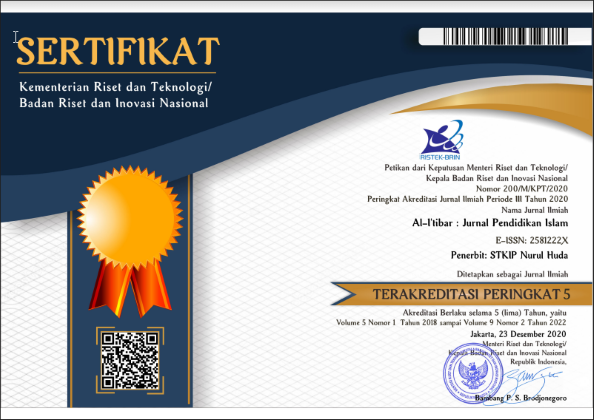Islam dan Pendidikan Adab Modern: Dakwah Kekinian Sebagai Kontra Narasi di dalam Tiktok
Universitas Muhammadiyah Prof.Dr.Hamka.
DOI:
https://doi.org/10.30599/jpia.v11i1.3261Abstract
Tujuan dari penulisan atau penelitian ini adalah untuk mengetahui efektifitas platform media Tiktok sebagai sarana atau media dakwah umat Islam yang pada akhirnya akan membuka pikiran masyarakat atau khususnya pembaca bahwa Tiktok tidak hanya memberikan pengaruh negatif saja, tetapi banyak hal positif yang dapat peneliti lakukan dan temukan di platform media sosial tersebut. Penelitian ini menggunakan metode penelitian kualitatif. Data yang digunakan dalam penelitian ini diperoleh dari berbagai jurnal yang sesuai dengan variabel penelitian. Evaluasi dari penelitian ini diharapkan mampu memberikan pemahaman atau wawasan kepada khalayak.
Kata kunci: Pendidikan Islam, Tiktok, Dakwah.
Downloads
References
Adnan, N. I., Ramli, S., & Ismail, I. N. (2021). Investigating the usefulness of TikTok as an educational tool. International Journal of Practices in Teaching and Learning (IJPTL), 1(2), 1–5.
Akko, B. T. (2018). Pengaruh pendidikan agama islam terhadap akhlak (perilaku jujur). IQRO: Journal of Islamic Education, 1(1), 55–70.
Alfiana, N., & Budiantoro, W. (2021). Al-Quran Dan Budaya Profetik: Mencetak Insan Kamil Di Era Milenial. Intiqad: Jurnal Agama Dan Pendidikan Islam, 13.
Barbalet, J. M. (1980). Principles of stratification in Max Weber: an interpretation and critique. British Journal of Sociology, 401–418.
Bekhuis, H., Meuleman, R., & Lubbers, M. (2013). Globalization and support for national cultural protectionism from a cross-national perspective. European Sociological Review, 29(5), 1040–1052.
Carney, F. S. (1983). Some aspects of Islamic ethics. The Journal of Religion, 63(2), 159–174.
Cohen, A. B., Wu, M. S., & Miller, J. (2016). Religion and culture: Individualism and collectivism in the East and West. Journal of Cross-Cultural Psychology, 47(9), 1236–1249.
Collins, E. F. (2003). Islam is the solution: Dakwah and democracy in Indonesia. Kultur, the Indonesian Journal for Muslim Cultures, 3(1), 148–182.
Ekström, M. (1992). Causal explanation of social action: the contribution of Max Weber and of critical realism to a generative view of causal explanation in social science. Acta Sociologica, 35(2), 107–122.
Eliraz, G. (2004). Islam in Indonesia: Modernism, radicalism, and the Middle East dimension (Vol. 11). Sussex Academic Press Brighton.
Fabriar, S. R. (2020). Agama, Modernitas dan Mentalitas: Implikasi Konsep Qana’ah Hamka Terhadap Kesehatan Mental. Muharrik: Jurnal Dakwah Dan Sosial, 3(02), 227–243.
Fatimah, A., & Fuad, N. (2018). Purifikasi Dan Modernisasi Di Muhammadiyah Ranting Ulujami Jakarta Selatan. 9(1), 47–58. http://journal.uhamka.ac.id/index.php/jpi
Fatimah, A., & Fuad, N. (2018). Purifikasi Dan Modernisasi Di Muhammadiyah Ranting Ulujami Jakarta Selatan. 9(1), 47–58. http://journal.uhamka.ac.id/index.php/jpi
Harwood, E. (2021). TikTok, identity struggles and mental health issues: How are the youth of today coping. Identity and Online Advocacy Conference.
Hasan, N. (2012). Islamist party, electoral politics and Da’wah mobilization among youth: The prosperous justice party (PKS) in Indonesia. Journal of Indonesian Islam, 6(1), 17–47.
Juneja, M., & Mauelshagen, F. (2006). Disasters and pre-industrial societies: Historiographic trends and comparative perspectives. The Medieval History Journal, 10(1–2), 1–31.
Khlaif, Z. N., & Salha, S. (2021). Using TikTok in education: a form of micro-learning or nano-learning? Interdisciplinary Journal of Virtual Learning in Medical Sciences, 12(3), 213–218.
Maghfirah, F., Andriani, F., & Mirzal, H. (2021). Social Media as a Medium of Da’wah: Religious Transformation among Online Da’wah Audience on TikTok Platform. LENTERA.
Mala, F. (2020). Mengkaji Tradisi Nabi Sebagai Paradigma Dakwah Yang Ramah. Dakwatuna: Jurnal Dakwah Dan Komunikasi Islam, 6(1), 104–127.
Meuleman, J. (2011). Dakwah, competition for authority, and development. Bijdragen Tot de Taal-, Land-En Volkenkunde/Journal of the Humanities and Social Sciences of Southeast Asia, 167(2–3), 236–269. https://doi.org/https://doi.org/10.1163/22134379-90003591
Modood, T. (2019). Essays on secularism and multiculturalism. Religion, State and Society, 47, 508–512.
Mubasyaroh, M. (2016). Da’Wah model of prophet Muhammad in Madina. QIJIS (Qudus International Journal of Islamic Studies), 2(1), 47–62.
Nur Fuad, A. F. (2019). Modernity and The Islamists Notion of Active Da’wa. Afkaruna, 15(2), 187–203. https://doi.org/10.18196/aiijis.2019.0102.187-202
Panday, R. (1983). Max Weber’s theory of social stratification: Controversies, contexts and correctives. Sociological Bulletin, 32(2), 171–203.
Peña-Fernández, S., Larrondo-Ureta, A., & Morales-i-Gras, J. (2023). Feminism, gender identity and polarization in TikTok and Twitter. Comunicar, 21, 49–60.
Qodir, Z. (2019). Islam berkemajuan dan strategi dakwah pencerahan umat. Jurnal Sosiologi Reflektif, 13(2), 209–234.
Qomarudin, M. (2019). Model Pengembangan Kurikulum PAI Multikultural. Al-I’tibar : Jurnal Pendidikan Islam, 6(2), 98–101. https://doi.org/10.30599/jpia.v6i2.647
Raihan, R. (2019). Dakwah Menurut Perspektif Buya Hamka. Al-Idarah: Jurnal Manajemen Dan Administrasi Islam, 3(1), 57–72.
Ramadhan, A. R., & Fuad, A. F. N. (2023). Religious Authority in Islamic Law: A Debate on Conservative and Progressive Methods. Afkaruna: Indonesian Interdisciplinary Journal of Islamic Studies, 19(1). https://doi.org/10.18196/afkaruna.v19i1.18507
Raza, S. (2023). Max Weber and Charles Taylor: On normative aspects of a theory of human action. Journal of Classical Sociology, 23(1), 97–136.
Sharabati, A.-A. A., Al-Haddad, S., Al-Khasawneh, M., Nababteh, N., Mohammad, M., & Abu Ghoush, Q. (2022). The impact of TikTok user satisfaction on continuous intention to use the application. Journal of Open Innovation: Technology, Market, and Complexity, 8(3), 125.
Sirozi, M. (2004). Secular–religious debates on the Indonesian National Education System: colonial legacy and a search for national identity in education. Intercultural Education, 15(2), 123–137.
Stahl, C. C., & Literat, I. (2023). # GenZ on TikTok: the collective online self-portrait of the social media generation. Journal of Youth Studies, 26(7), 925–946.
Takdir, M. (2020). Contestation and the roles of Islam in the public sphere: A sociological analysis of religious secularization in Indonesia and the West. Afkaruna: Indonesian Interdisciplinary Journal of Islamic Studies, 16(2), 154–174.
Voevoda, E. V. (2020). Intercultural communication in multicultural education space. Training, Language and Culture, 4(2), 11–20.
Zeitlin, M. (1960). Max Weber on the sociology of the feudal order. The Sociological Review, 8(2), 203–208.
Downloads
Published
How to Cite
Issue
Section
License
Copyright (c) 2024 WIRANTHY NUR SYAWITRI RANTHY, Shobah Shofariyani Iryanti

This work is licensed under a Creative Commons Attribution 4.0 International License.




